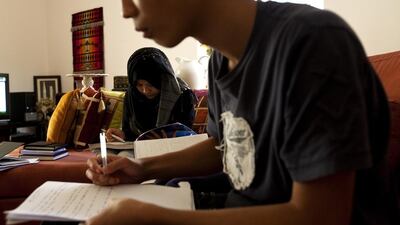For those of us who home school our children, the whole world is a school. You know you are a home schooler if you are friends with the staff at your local museum, if your children can explain the logic behind the Zodiac signs or if Zumba is your student’s preferred form of physical education.
Home schooled kids are adorable dorks. Some read and write in three languages and love to collect the bugs found in lettuce for scientific study. As for the question of social lives, my children have many friends who love to play at our house because of all the educational toys we keep.
Last month, The National reported that the Ministry of Education appeared to be pondering more strict regulatory oversight of home schooling, but my question is why?
The main reason families home school is because there is more freedom to explore a subject in as many ways and for as long needed. Such as using building blocks to construct an animal or plant cell, or going on a walk to understand the difference between vascular and non-vascular plants or constructing a comprehensive chronology of the Renaissance.
Another reason is the quality of the learning that one can give one’s children outside the school system, which lobs a group of kids together, often in the most challenging ways.
For example, if children are in a class based on ability, kids in remedial classes will sense that expectations of them are low and won’t even try to do well. A teacher seeing this may feel that it is a waste of his time to push them to aim high.
In a classroom of 20 children you may have several levels of ability in a lesson of 40 minutes, minus ten for handing out materials, disruptions, questions and bathroom breaks. And then the bell rings.
There are a variety of ways that parents educate their children at home. Some send their children to a “class” where a teacher tutors a handful of students using a curriculum. Others use the curriculum themselves to construct a schedule of activity.
Then there are also unschoolers. Unschooling is child-directed education, which builds on the child’s interests, natural curiosity and love of learning. John Holt, founder of the unschooling movement, argued that learning is in the stream of life: “Children learn naturally, parents should provide the stimuli and let the children learn on their own.”
I know this seems scary to some, but the concept has merits. Children can learn naturally, just like they learn walking and talking, sometimes often without any direct lessons or structure.
One home schooling parent in Ajman, told me her reason for opting her children out of school: “After speaking to an unschooling mother and reading books on unschooling, I came to the conclusion that starting school at four years old was too young for my children and that ‘one size’ does not fit all. I really didn’t feel OK about handing my children over to strangers at such a young age.”
This is where all of the reasons to home school begin to dovetail.
Firstly, because you know your child most. You are the one who can help him with his weaknesses and foster his talent. Secondly, the bonds that you build will be worth all of the parent coffee mornings you will miss. Finally, you will have a child who knows what is expected from them and will really try their best to meet the educational goals he set for himself.
Educator Sir Ken Robinson says: “Intelligence is wonderfully interactive and it comes through different disciplinary ways of seeing things.”
This goes beyond just reading and writing. For home educators, it’s the end product that matters most and delivering a person whose talents have not been squashed out of them.
Maryam Ismail is a sociologist and teacher who divides her time between the US and the UAE

